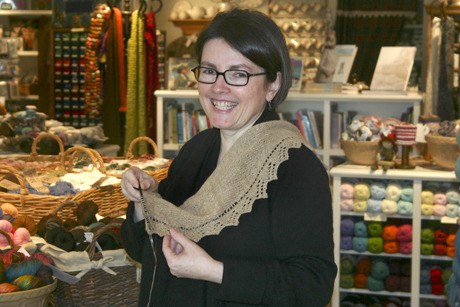Linking an island in the Puget Sound with a nature reserve in Argentina’s Patagonian Steppe may seem unlikely, but anything is possible as the distance between global cultures continues to shrink.
For instance, entente occurred a couple of years ago when Bainbridge Island’s philanthropic nature bumped into a small tribe of poverty-stricken Mapuches that had discovered how to safely remove rare wool from guanacos – a wild camelid specie that migrates throughout the lower slopes of the Andes Mountains.
Bottom line, as of tomorrow, island knitters will find skeins of this natural, rustic fiber at Churchmouse Yarns & Teas in Winslow. It is believed to be the first time the wool has been legally offered for sale in the U.S.
The story begins with Carl Mundt, an islander raised in Argentina who continues to have business interests in the country. Mundt, who along with Jay Hastings founded Sustainable Communities International, asked a scientist during a visit to Buenos Aires two years ago if he knew of a project the nonprofit could sponsor.
The scientist told him about a group of about 100 native people living as goat herders on the Reserva la Payunia, located east of the Andes. In 2005 they had formed a “cooperativa” and set out to shear wool from guanacos in a sustainable manner that was non-threatening to the animals.
During springtime (October), they herd many of the animals (related to the wild vicunas and domesticated llamas and alpacas) into a man-made trap, then individually blindfold and quickly shear their precious wool before releasing them unharmed. Gradually, they have become more efficient and last year they gathered wool from about 250 of an estimated 15,000 guanacos that live and migrate through the reserve.
“They collected about 100 kilos (220 pounds) last year and now have an inventory of 250 kilos,” said Mundt, who took on the responsibility of helping get the product to the market.
The project’s purpose is twofold: to provide the people with economic opportunity and, by changing their relationship with the animals, ensuring that the guanacos’ existence will be less threatened by hunters.
The government reserve is located in an area so isolated that there are no roads, no electricity nor electronic contact with the outside world. Essentially, until Mundt came along, the natives had a product but no knowledge of how to make it marketable and distribute it.
The guanaco population once numbered 700 million, but has been reduced to an estimated 700,000 primarily because of hunters. They are now listed by the Convention on International Trade in Endangered Species (CITES). Trade in guanaco yarn and fiber is permitted only if the appropriate governments (Argentina and the U.S. in this case) certify that the merchandise was produced in a sustainable way without damage to the animal population.
Mundt contacted Kit Hutchin of Churchmouse and Cindy Howard-Gibbon of Foxglove Fiberarts Supply, a Bainbridge-based wholesaler of bulk wool, looms, spinning wheels and other fiber products. The legal restrictions are many, but both businesses recently received the first of many orders they plan to make.
Churchmouse now has 25 skeins (coils of yarn) and expects more soon.Each skein represents wool cleaned and hand spun by Payunia women from one animal, which allows its color (different shades of a creamy carmel) and gauge to be consistent. It also ensures that each skein is a little different from another.
“We’re excited because it’s a rare, luxury fiber that no one else has yet,” Hutchin said this week. “But it’s also a nice way to help people make a living.”
Howard-Gibbon, whose business donated a spinning wheel (and plans to donate more) to the cooperativa, has purchased about 22 pounds of the wool.
“It’s wonderful – a very soft and downy undercoat that’s fine and fluffy,” she said. “Spinnners love to run exotic fibers through their fingers so it’s pretty exciting. It’s coveted because it’s only been available in the U.S. through the black market. And if you’re a good person you don’t go that way.”
Mundt said the Payunia have only two spinning wheels, but no shortage of wool nor women capable of cleaning and spinning it.
“I’m taking more wheels there next week,” he said. “We’ve got our first sales now, so it’s just a matter of increasing production. We’re on our way.”
Come see
A presentation will be held at 3-5 p.m. Saturday about the Bainbridge-guanaco connection at Churchmouse Yarns & Teas. Attendees will also have an opportunity to knit some guanaco yarn.



